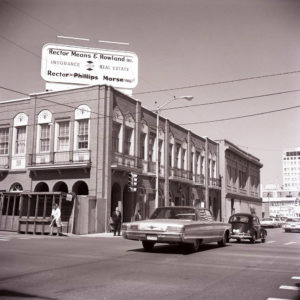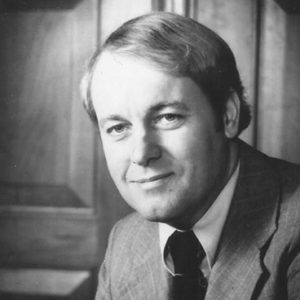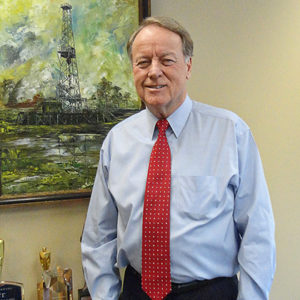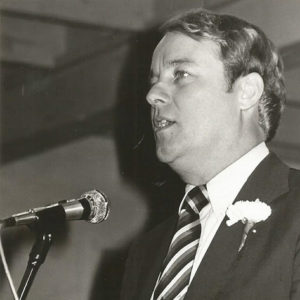calsfoundation@cals.org
Edward Sheffield Nelson (1941–)
Edward Sheffield Nelson, a Little Rock (Pulaski County) attorney, utility executive, and political leader, served as president and chief executive officer of Arkansas Louisiana Gas Company (Arkla) from 1973 to 1984 and twice ran for governor of Arkansas.
Sheffield Nelson was born on April 23, 1941, near Keevil in rural Monroe County to Robert F. Nelson and Thelma Mayberry Nelson. He, his parents, and three sisters lived an itinerant life, moving from place to place in eastern Arkansas for work. His father abandoned the family in 1957, leaving his sixteen-year old-son as the main breadwinner. Nelson worked after school in a Brinkley (Monroe County) grocery store until he graduated from high school. He married his high school sweetheart, Mary Lynn McCastlain, the daughter of a state representative and a clerk of the Arkansas House of Representatives, in 1962; they had three daughters.
Nelson enrolled at Arkansas State Teachers College in Conway (Faulkner County), now the University of Central Arkansas (UCA), in 1959. He originally had a track scholarship, but he switched to a work-study plan and involved himself in campus politics, being elected president of the student body his senior year. He had been previously introduced to Wilton R. “Witt” Stephens, the powerful head of Arkla Gas, and Stephens was impressed enough with Nelson that he offered him a job as soon as he graduated. He rose rapidly as a salesman and executive while attending law school at night, graduating from what is now the University of Arkansas at Little Rock William H. Bowen School of Law in 1969. Stephens designated Nelson his successor, and in 1973, Nelson became president of Arkla at age thirty-two.
Soon after assuming Arkla’s helm, a major split occurred between Nelson and his predecessor when, in 1975, Nelson refused to renegotiate old gas contracts with Stephens Production Company and lobbied heavily to defeat a bill in the 1977 Arkansas General Assembly that would have required Arkla to use its pipelines to transport gas in the western part of the state from Stephens Production’s wells to customers of the Arkansas Missouri Gas Company based in Blytheville (Mississippi County). Witt Stephens never got over his resentment over his successor’s actions. Nelson retired from Arkla on December 31, 1984, and designated Mack McLarty as his successor.
In 1965, Nelson had unsuccessfully sought the presidency of Arkansas’s Young Democrats as a supporter of Governor Orval Faubus against the reform-minded “Young Turk” faction. However, he did serve in several appointive capacities under Governors David Pryor, Frank White, and Bill Clinton, and led efforts to raise the governor’s salary and the severance tax on natural gas. By 1986, Nelson started making steps toward a bid for the Democratic gubernatorial nomination but stepped back when Bill Clinton opted to seek a fourth term. He had been appointed by Clinton to the Arkansas Industrial Development Commission (which later became the Arkansas Economic Development Commission), and it was expected that this position would be a springboard for him to run for governor. Having expressed dissatisfaction with the Democratic Party, and in part as a result of his friendship with former Governor Frank White, Nelson joined the Republican Party in 1989 and announced his candidacy for governor, joining another ex-Democrat, Second District Congressman Tommy Robinson, in the 1990 Republican Primary.
The campaign was marked by controversies such as the financing of Robinson’s Monroe County farm, the involvement of the Stephens family, and the Arkla-Arkoma gas deal negotiated between Nelson and Dallas Cowboys owner Jerry Jones (a one-time friend of Robinson). Arkoma was a natural-gas play in western Arkansas that was developed by Jones for Arkla as a solution to the company’s industrial customers’ long-term supply needs, but it was bought back by Arkla for far more than it was sold to Jones. Robinson would purchase an interest in a rice and milo farm near Brinkley with Jones, but after attacks on Nelson over Arkoma, Jones called in his loans to his former friend. Nelson won the nomination with fifty-four percent of the vote. Much of Nelson’s margin came from several thousand Democrats in Pulaski County who crossed over to vote in the GOP primary. Arkoma continued to dominate the fall campaign, and Clinton won his fifth term with fifty-seven percent of the vote. Nelson made one more attempt in 1994, losing to Jim Guy Tucker, who gained sixty percent of the vote.
Nelson remained active in public affairs. He served with Asa Hutchinson for a year as co-chair of the state Republican Party and served as its national committeeman for a decade. In 1997, Governor Mike Huckabee named Nelson to the Arkansas Game and Fish Commission, and he served from 2006 to 2007 as chairman. A top public policy priority of Nelson’s since his early days as president of Arkla was raising the severance tax on natural gas. Arkansas had the lowest rate in the country, and Nelson had long argued that the revenue could be used to bolster funding for higher education and highways. He worked to lead a statewide ballot initiative to raise the severance tax but fell far short of the needed signatures to gain ballot access. He considered making a third gubernatorial in 2014 as a Republican or an independent, but he ultimately supported Asa Hutchinson, who served with him as GOP co-chair.
Nelson practices law in Little Rock. After a petition effort in 2015 to persuade Governor Asa Hutchinson to appoint him to the vacant chief justice seat, he announced he would decline an appointment if offered, citing other commitments. On February 8, 2016, Nelson was appointed by Governor Hutchinson to the University of Arkansas System Board of Trustees. In June 2023, however, Nelson said that he would not serve as the board’s next chairman because he did not feel that he could work closely with UA System President Donald Bobbitt. Nelson cited Bobbitt’s secretive (and failed) effort to make a deal to buy the online University of Phoenix as well as his attempt to “buy off” Charles Robinson II in 2022 to drop out of the running to become University of Arkansas in Fayetteville (Washington County) chancellor; Robinson, the board’s choice, did become chancellor.
For additional information:
Bowden, Bill. “Nelson Says He Won’t Serve as UA System Board Chairman.” Arkansas Democrat-Gazette, June 9, 2023. https://www.arkansasonline.com/news/2023/jun/09/nelson-says-he-wont-serve-as-ua-system-board/ (accessed June 12, 2023).
Brock, Roby. “Sheffield Nelson Weighing Governor’s Run as Republican or Independent.” Talk Business & Politics, February 12, 2013.
Howard, Phoebe Wall. “Mary Lynn Nelson Leaves the Spotlight to Spouse.” Arkansas Gazette, June 17, 1990, pp. 1A, 10A.
Lewis, Bill. “Ark La Head Credits Rise to Timing, Salesmanship.” Arkansas Gazette, March 25, 1973, pp. 1C, 2C.
———. “Witt Stephens vs. Sheffield Nelson: The ‘Hunch’ That Didn’t Pan Out.” Arkansas Times, July 1980, pp. 56–58, 60, 63–64, 67–68.
Millar, Lindsey. “Hutchinson Names Sheffield Nelson, Kelly Eichler to University of Arkansas Board.” Arkansas Times, February 8, 2016.
Moser, Anthony. “Adversity Brings out the Best in Nelson.” Arkansas Democrat, February 19, 1989, pp. 1J, 8J.
Reed, John. “Nelson Says Poverty of His Youth Fueled Drive for Success.” Arkansas Gazette, February 25, 1990, 1C.
“Sheffield Retires—An Era Ends.” Arkla News, December 1, 1984.
Ward, James. “Whatever Happened to The Group?” Arkansas Times, July 1990, pp. 60–68.
Revis Edmonds
Arkansas State University
 Business, Commerce, and Industry
Business, Commerce, and Industry Divergent Prosperity and the Arc of Reform, 1968–2022
Divergent Prosperity and the Arc of Reform, 1968–2022 Politics and Government
Politics and Government Arkla Building
Arkla Building  Sheffield Nelson
Sheffield Nelson  Sheffield Nelson
Sheffield Nelson  Sheffield Nelson
Sheffield Nelson 




Comments
No comments on this entry yet.